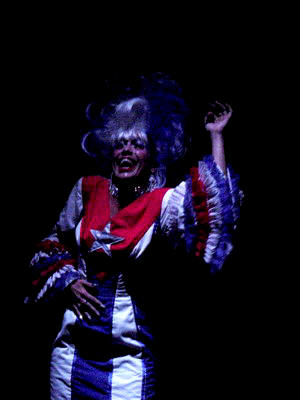 The great Reina de la Salsa must be turning in her grave (no disrespect).
The great Reina de la Salsa must be turning in her grave (no disrespect).From the Washington Post, July 17, 2003
On New Year's Eve 1958, Batista stole away in the middle of the night and the next morning Castro gave his first speech from a balcony as Cuba's new leader. Eighteen months later, La Sonora Matancera -- including [Celia] Cruz -- took advantage of what was supposed to be a routine trip to perform abroad, and defected. They landed first in Mexico but inevitably made their way north, settling for a time in Los Angeles. Cruz married the band's first trumpeter, Pedro Knight, who also became her longtime manager and musical director.
To the end of her days, Celia was a bitter foe of fidel, and with good reason. Celia stood alongside with her fellow compatriots and denounced the Cuban regime. The world also loved Celia, even those that politically were at odds with her.
Very little of this [her] music was ever heard in Cuba. "Castro never forgave me," she once said, and she was right: The Cuban government denied her permission to come home for her father's funeral. Books about Cuban music published on the island after the revolution didn't even mention her name.OK, so where am I headed with this story? It seems that all is forgiven, and the Cuban regime is now permitting Celia to visit, at least her ghost. A new stage production Delirio habanero by Cuban writer Alberto Pedro now plays in Havana. The ghosts of Celia and Benny Moré appear to entertain postmortem. It easier to manipulate ghosts, and they have no opinion.
But neither did she ever forgive Castro, whom she denounced as she stood shoulder to shoulder with other anti-Castro Cuban exiles. These two larger-than-life Cubans of the late 20th century considered each other nonpersons.

Recuerdan a Celia Cruz en la obra Delirio habaneroPhoto of Celia's ghost as played by Laura de la Uz (who?) lifted from Cuban blogger Jesus (not the deity) on line.
Notimex
El Universal
Ciudad de México
Sábado 15 de julio de 2006
Homenajea el dramaturgo cubano Alberto Pedro a la artista en su obra, la cual protagoniza Laura de la Uz y en la que se revive el glamour de las noches cubanas de antaño
A tres años de su fallecimiento, la cantante cubana Celia Cruz sigue vigente en los escenarios y se reencuentra con el fantasma de otra gloria de la música de la isla del Caribe, Benny Moré, a través de la nueva versión de “ Delirio habanero ” , obra del dramaturgo cubano Alberto Pedro (1954-2005) .
En este montaje es posible ver a Celia Cruz (Laura de la Uz, protagonista de la cinta "Hello Hemingway") cantando ataviada con un ceñido vestido que simboliza la bandera cubana, disfrutar de un baile imaginario entre la “ Reina ” y el “ Bárbaro ” (Mario Guerra) o imaginar el glamour de las noches cubanas de antaño a través de los relatos de Varilla (Amarilis Núñez) .
La voz, carisma y talento de Celia Cruz, la “ Reina de la Salsa ” , nacida el 21 de octubre de 1929 en La Habana, Cuba, dieron lugar a una de las trayectorias más impresionantes en el mundo de la música, al decir de los críticos.
Sus más de 70 álbumes generaron una cosecha interminable de “ Discos de Platino ” y “ Oro ” , y recibió más de un centenar de premios de prestigiadas instituciones de diversas partes del mundo.
En 1989 recibió el primero de sus cinco premios Grammy, a los que se sumaron dos más del Grammy Latino.


2 comments:
That's what we all loved about Celia, she always stood for FREEDOM and always stood firmly against the dictator. The dictator tried to erase our beloved Celia Cruz and Beny More, but in the long run he can not.The dictator is losing and the clock is ticking!!!
The dictators method are always to eradicate by execution, prison and exile to have his selective history
Gracias Orlando por tu comentario!, mi papá (que está en Cuba) se llama como tú.
No soy muy buena escribiendo en el blog, pero me gusta escribir mucho, aunque no lo haga tan bien como tú, es que desde que llegué a este pais no habia encontrado un lugar donde uno pudiera decir lo que le dé la gana sobre cualquier cosa, y una sale de Cuba con unos tremendos deseos de hablar lo que no se podía hablar allí, aunque yo fuí bastante rebelde y atrevida mientras que viví en Cuba.
Post a Comment